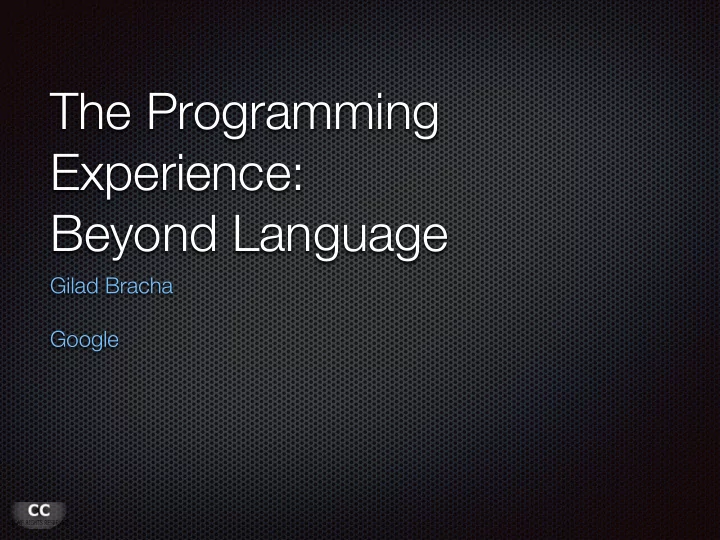

The Programming Experience: Beyond Language Gilad Bracha Google
What are Programming Languages for?
What are Programming Languages for? For building programs
How do you Build a Program?
How do you Build a Program? With a Programming Language?
How do you Build a Program? No, with an Editor
How do you Build a Program? No, with an Editor & a Programming Language
How do you Build a Program? No, with an Editor & a Programming Language & a Compiler/Interpreter
How do you Build a Program? No, with an Editor & a Programming Language & a Compiler/Interpreter & a Debugger, a Profiler …
How do you Build a Program? With Tools
Tools are a Legitimate Research Area Tools are no more “just engineering” than languages and compilers Tools enhance productivity Tools interact with language design There are real issues of performance and design
A Literate Tradition “Il n'y a rien en dehors du text” Foucault, referencing Derida
Is There Nothing Outside the Text? Actual programming is more than just text Languages do not exist in a vacuum. Languages are part of a broader experience , dependent on quality of implementation, libraries, tools and support Once upon a time, we knew this
An Empirical Tradition (loop (print (eval (read))))
BASIC Interactivity
Beyond the REPL REPLs still focus on text, but they are a first step moving from text to experience
Smalltalk: The Alto
Lisp Machines
Integrating the Traditions Experience requires more than mathematics; more than electrical engineering. It requires psychology, and even art
Architecture & Programming Languages Neither is science Neither is pure art Neither is pure engineering Each combines art & engineering.
Novelty & Utility New knowledge is the name of the game in science In engineering, utility is more important than novelty In art, novelty can be the incarnation of new knowledge, or mere fashion In PLs, as in architecture, both matter
What are Programs for?
What are Programs for? For modeling real or imaginary worlds
What are Programs for? For modeling real or imaginary worlds
Beyond Language: Snapshots and the Sea of Objects What matters is the live process, not just the text One must be able to save the process and restore it Quickly and reliably The saved process should be portable and shareable
Explore & Modify the Heap Things you can’t do without the right primitives become: allInstances
Language Still Matters
Language Still Matters The sea of objects is landlocked It is really hard to move an object from one sea to another Objects are hard to serialize - we need values If we want to share programs, language text is valuable
Language & Snapshots can Cohabit Smalltalk can be separated from the image model We did it in Strongtalk 20 years ago Even more so in Newspeak Images are good in as much as they provide a great experience http://gbracha.blogspot.com/2009/10/image- problem.html
Language Still Matters The sea of objects is landlocked There is no such thing as an “interpreted language”.
Language Still Matters Phrases like “interpreted language” make no sense. Ditto a “compiled language”.
Language Still Matters Phrases like “interpreted language” make no sense. Ditto a “compiled language”. Or even “dynamic language” or “static language”.
A Static Language
Experience Dominates Interpreted language - a language whose main implementations are interpreted Compiled language - a language whose main implementations are compiled Dynamic language - a language whose program texts may be dynamic Static language - a language that isn’t dynamic
Language Still Matters The sea of objects is landlocked There is no such thing as an “interpreted language”. Types can be useful
There is Work to be Done
1
Ampleforth : Live Literate Programming Issues: namespaces and versions Better text processing tools See Eve
2
Code and Data Editors, class browsers divorce code from data REPLs, workspaces, object inspectors, debuggers show data & code but code is de-emphasized. Idea: bring code & data together at all times
Debug Mode is the Only Mode Live 2013 demo http://gbracha.blogspot.com/2013/04/making- methods-live.html
Where to get Data? Tests?
Where to get Data? Tests Type annotations?
Where to get Data? Tests Type annotations Type inference? Machine Learning?
Where to get Data? Tests Type annotations Type inference Machine Learning All of the above; they can re-enforce each other
3
Time Traveling Debugging
Time Traveling Debuggers A time traveling debugger is worth a thousand language features Query the history of the computation for events of interest and go back to the time of the event
Is FP going live? Liveness may be the killer feature for functional programming Reactive UIs Time traveling debugging becomes a lot easier See Elm, Clojure
Conclusions Programming Languages are more like Architecture than Civil Engineering Programmers are experimenters, empiricists engaged in modeling They need tools beyond text We must attend to their overall experience
This file is licensed under the Creative Commons Attribution ShareAlike 3.0 License. In short: you are free to share and make derivative works of the file under the conditions that you appropriately attribute it, and that you distribute it only under a license identical to this one. Official license .
Recommend
More recommend